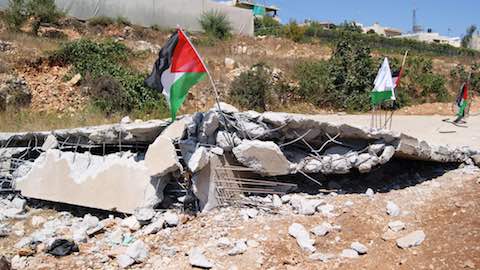- MENU
- HOME
- SEARCH
- WORLD
- MAIN
- AFRICA
- ASIA
- BALKANS
- EUROPE
- LATIN AMERICA
- MIDDLE EAST
- United Kingdom
- United States
- Argentina
- Australia
- Austria
- Benelux
- Brazil
- Canada
- China
- France
- Germany
- Greece
- Hungary
- India
- Indonesia
- Ireland
- Israel
- Italy
- Japan
- Korea
- Mexico
- New Zealand
- Pakistan
- Philippines
- Poland
- Russia
- South Africa
- Spain
- Taiwan
- Turkey
- USA
- BUSINESS
- WEALTH
- STOCKS
- TECH
- HEALTH
- LIFESTYLE
- ENTERTAINMENT
- SPORTS
- RSS
- iHaveNet.com: Middle East

If Israel Wants to Prevent Terrorism, It Should Stop Evicting Palestinians
By Laith Shakir
Housing demolitions create an environment of constant anxiety for Palestinians in the West Bank and Jerusalem, increasing the likelihood of violent retaliation.
Late last year, two Palestinian cousins broke into a Jerusalem synagogue, killing five Israelis before being slain by police.
In retaliation, as part of the government's "counterterrorist deterrence policy," the homes of these two Palestinians were slated for demolition. Their houses were destroyed on October 6th of this year, displacing six of their family members.
A week later, their cousin Alaa Abu Jamal drove his car into a Jerusalem bus stop and killed a bystander with a cleaver.
This episode is emblematic of a larger phenomenon: Israel's "punitive housing demolitions" are not only ethically problematic and illegal under international law, which -- under the Fourth Geneva Convention -- prohibits the "occupying power from destroying private property or forcibly transferring the protected population." They're also blatantly counterproductive at deterring terrorism.
Tensions in Jerusalem -- as well as in Israel-Palestine more generally -- are often boiled down to ethnic rivalry and conflicts over access to the city's historic places of worship. But media reports often ignore or play down much more concrete grievances like home demolitions, which may have inspired Alaa Abu Jamal and others like him to lash out against Israeli civilians.
In order to better comprehend the recent wave of stabbings, a look at one of Israel's least discussed policies is necessary. Housing demolitions, both as a military tool of "deterrence" and civil tactic of displacement, create an environment of constant anxiety for Palestinians in the West Bank -- conditions that can account for the spate of violence in the past few months.
The precedent for punitive demolitions comes from the Defence Emergency Regulation (DER)119 -- a 1945 law established under British colonial rule -- which authorized the confiscation and destruction of "any house, structure, or land" owned by an alleged perpetrator of violence.
In the decades since, the Israeli military has used DER 119 to seal up or demolish thousands of Palestinian homes under the pretext of deterring terrorism. In 2005, however, the IDF discontinued the practice after internal studies demonstrated its ineffectiveness at achieving its stated goal. In fact, as one official remarked, "the policy had caused Israel more harm than good by generating hatred among the Palestinians."
Yet current Prime Minister Benjamin Netanyahu has been quick to forget the findings of his own military, revitalizing punitive demolitions in response to car bombings in Jerusalem last winter. The decision has sparked a violent backlash this year: at least ten Israelis have been murdered and more than 70 wounded, further undermining the policy's stated goal of counterterrorism.
Importantly, demolitions aren't just used to punish the families of suspected terrorists. In fact, Israel regularly demolishes the homes of civilians who have no terrorist affiliations. Between 1988 and 2014, Israel's Civil Administration issued 14,000 demolition orders in the West Bank, of which 11,000 are still outstanding and can be enforced at any time. Palestinians living in these condemned structures can be displaced at the whims of the ICA, and are often not notified of their demolition date until a bulldozer shows up at their doorstep. These incidents, which occur in East Jerusalem and Area C of the West Bank, occur when Israeli authorities accuse Palestinians of failing to obtain building permits for their homes.
While this may sound reasonable in theory, the sheer regulatory nightmare Palestinians are subjected to highlights their intentional exclusion from civic services. A study published on December 7th reveals that only 7 percent of building permits in Jerusalem go to Palestinian neighborhoods, despite the fact that they make up 41 percent of the city's population. Because permits are rarely -- if ever -- issued to Palestinians, they're forced to construct homes without them, giving Israel a "justification" for demolishing these structures and displacing their inhabitants.
Laura Wharton, a city councilor in Jerusalem, is unequivocally clear about the link between these demolitions and recent violence: she writes, "’If anyone thinks the Palestinians' frustration and rage are the result of incitement alone, the numbers and facts on the ground show otherwise."
Under these conditions, it's easy to understand the frustration of Jerusalemites; faced by impending demolitions, either as the result of familial ties or discrimination by civic services, Palestinians like Alaa Abu Jamal lash out violently. If Israel truly wants to mitigate civilian deaths going forward, it must cease demolitions immediately.
Otherwise, the cycle of violence will continue unabated.
Article: Courtesy Foreign Policy in Focus.
"If Israel Wants to Prevent Terrorism, It Should Stop Evicting Palestinians"